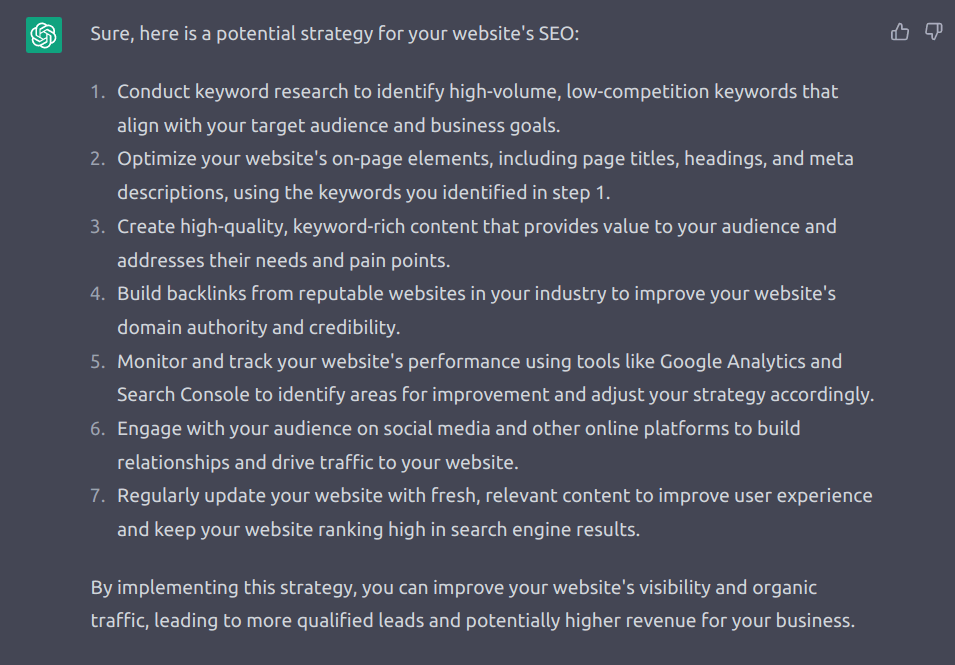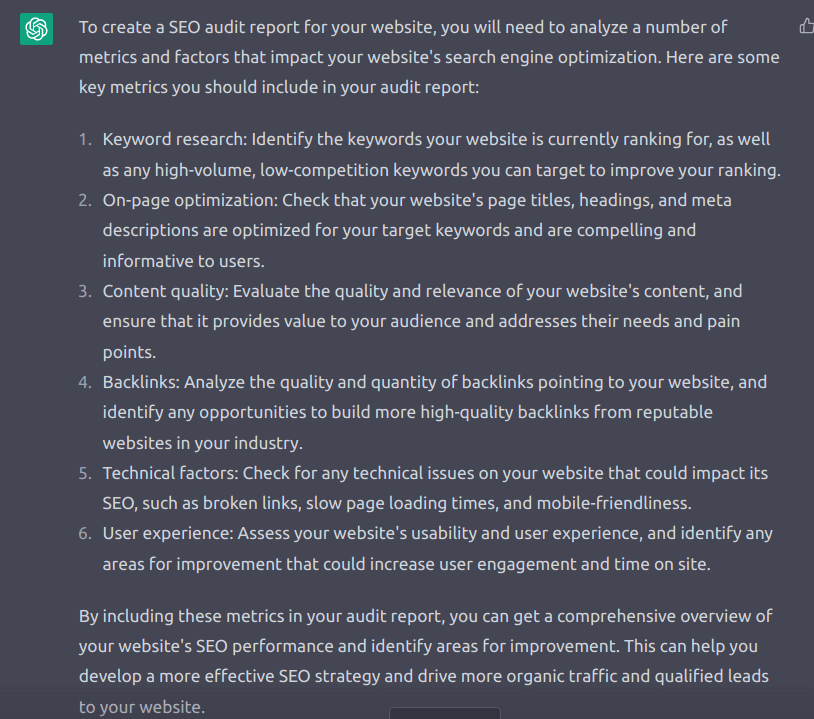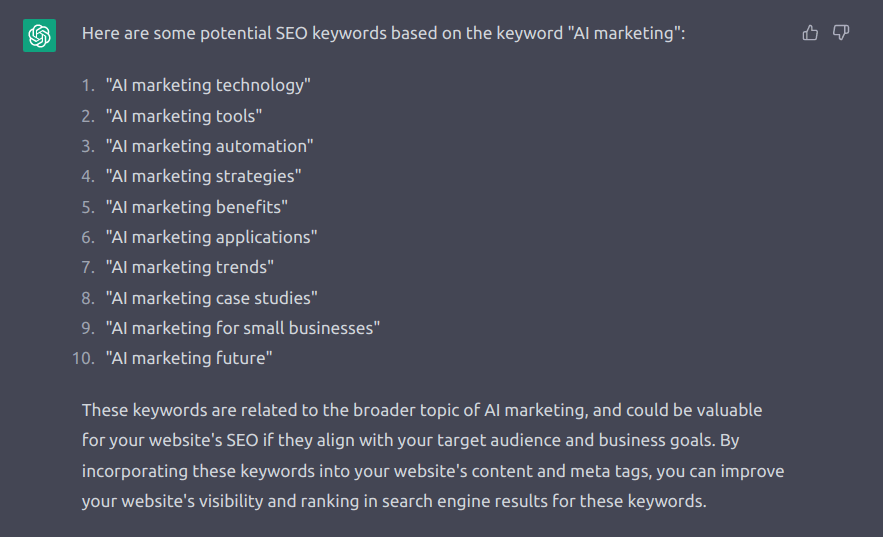AI is not yet ready to permanently replace marketing agencies. in the SEO space. Why is that? What practical example illustrates this in the SEO field? Let’s see one example,
The AI test for SEO
To test ChatGPT’s capabilities, I picked SEO as my channel and asked the AI to create a strategy for my website’s SEO. This is the strategy it formulated:

Right after, I asked the AI to audit my website’s SEO:

To create a SEO audit report for your website, you will need to analyze a number of metrics and factors that impact your website’s search engine optimization. Here are some key metrics you should include in your audit report:
- Keyword research: Identify the keywords your website is currently ranking for, as well as any high-volume, low-competition keywords you can target to improve your ranking.
- On-page optimization: Check that your website’s page titles, headings, and meta descriptions are optimized for your target keywords and are compelling and informative to users.
- Content quality: Evaluate the quality and relevance of your website’s content, and ensure that it provides value to your audience and addresses their needs and pain points.
- Backlinks: Analyze the quality and quantity of backlinks pointing to your website, and identify any opportunities to build more high-quality backlinks from reputable websites in your industry.
- Technical factors: Check for any technical issues on your website that could impact its SEO, such as broken links, slow page loading times, and mobile-friendliness.
- User experience: Assess your website’s usability and user experience, and identify any areas for improvement that could increase user engagement and time on site.
By including these metrics in your audit report, you can get a comprehensive overview of your website’s SEO performance and identify areas for improvement. This can help you develop a more effective SEO strategy and drive more organic traffic and qualified leads to your website.
Following, I asked to give me specific tactics to execute the strategy:
To get high-quality backlinks to improve your website’s SEO, you need to focus on building relationships and creating valuable, relevant content that other websites in your industry will want to link to. Here are some steps you can follow to get high-quality backlinks:
- Research your competitors’ backlinks: Use tools like Ahrefs and SEMRush to identify the websites that are linking to your competitors’ websites. These websites may be potential link building opportunities for you as well.
- Create valuable content: Develop content that provides value to your audience and addresses their needs and pain points. This could be in the form of blog posts, videos, infographics, or other formats that are relevant and engaging to your audience.
- Reach out to influencers and industry experts: Connect with influencers and industry experts in your niche and offer to guest post on their website, provide expert insights for their content, or collaborate on a project. This can help you build relationships and earn high-quality backlinks from reputable websites in your industry.
- Monitor and track your backlinks: Use tools like Ahrefs and Google Search Console to monitor and track the backlinks pointing to your website. This will help you identify any low-quality or irrelevant backlinks, and take action to remove or disavow them if necessary.
By following these steps, you can build high-quality backlinks from reputable websites in your industry, which can improve your website’s domain authority and credibility, and ultimately improve your website’s ranking in search engine results.
I also asked the AI to give me a list of keywords to target:

And create a content plan for my website:
To create a list of keywords to target for your website, you will need to conduct keyword research to identify high-volume, low-competition keywords that align with your target audience and business goals. Here are some steps you can follow to create a list of keywords to target:
- Identify your target audience: Think about who your ideal customer is and what their needs, pain points, and interests are. This will help you determine the keywords that are most relevant and valuable to your audience.
- Research keyword ideas: Use tools like the Google Keyword Planner and Ubersuggest to generate a list of potential keywords that are related to your business and target audience.
- Analyze keyword metrics: Use tools like Ahrefs and SEMRush to analyze the search volume, competition, and difficulty of each keyword on your list. This will help you identify the keywords that have a high search volume and low competition, making them more achievable and valuable for your website.
- Create your keyword list: Based on your research and analysis, create a list of keywords that align with your target audience and business goals, and that have a high search volume and low competition.
To create a content plan for your website, you can use the keywords you identified in your keyword research as the basis for your content. Here are some steps you can follow to create a content plan:
- Identify your content goals: Think about what you want to achieve with your content, such as increasing website traffic, generating leads, or building brand awareness. This will help you determine the types of content that are most relevant and valuable to your audience and business.
- Choose your content format: Decide on the format of your content, such as blog posts, videos, infographics, or podcasts, based on your audience’s preferences and your business goals.
- Create a content calendar: Plan out the topics and keywords you will cover in each piece of content, as well as the publication date and any other details, such as guest authors or promotional tactics. This will help you organize and prioritize your content, and ensure that you are consistently publishing high-quality, keyword-rich content.
By creating a list of keywords to target and a content plan, you can develop a more effective SEO strategy and create content that resonates with your audience and drives organic traffic and qualified leads to your website.
We even challenged the AI with more tasks
Is true that when it came to ideation, the AI was able to give me ideas for blog posts to rank for SEO. The AI even went as far as give me 10 titles for a blog post, and then asked for even better titles. The AI was able to generate metadata for my blog post and handle some technical basics, but the quality of its answers was only average, at best.
Finally, I asked the AI to actually write the blog post for me. While the AI was able to complete all of these tasks in only 5 minutes, a human marketing professional with 1-2 years of experience would likely take several hours, if not a day or more, to complete the same tasks.
On that department the AI wins hands down. A human can’t compete with the speed of the AI.
But…
Can AI Replace Human Marketing Professionals?
The hot burning question after this research is: can the AI actually give me specific tactics to execute that strategy?
As more and more businesses turn to AI to automate their marketing tasks, the question arises: can AI fully replace human marketing professionals? While AI technology has made great strides in recent years, it is not yet ready to permanently replace human marketing professionals.
One area where AI excels is speed. AI is able to complete tasks much faster than a human marketing professional, making it a valuable tool for automating repetitive or time-consuming tasks. However, this speed comes at a cost. The quality of the AI’s output may not be as high as that of a human marketing professional, who is able to bring strategic thinking, creativity, and tactical understanding to the table.
In addition, AI technology is still in its early stages and is likely to improve in the coming years. However, it is currently not able to fully replace the strategic thinking, quality output, tactical understanding, and creativity of a human marketing professional.
While AI can be a valuable tool for automating certain tasks, it cannot replace the expertise and experience of a human marketing professional.
Overall, while AI has its advantages, it is not yet ready to fully replace human marketing professionals. It is important for businesses to strike a balance between leveraging AI technology and utilizing the skills and expertise of human marketing professionals.





